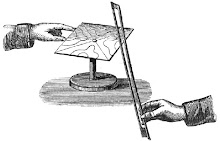On a separate note, we're hoping that we may focus on a sub-section of the recordings, the Composers Forum concert recordings, on reel-to-reel tapes. The Composers Forum was established in 1935, with funding from the WPA, to present the work of American composers. It was active initially in New York; when the WPA ended, it continued briefly in San Francisco under private patronage, went on hiatus during the war, and then was revived under the joint sponsorship of the New York Public Library and Columbia University in 1947.

The reel-to-reel tapes in the archives here represent recordings from this later phase of the Composers Forum. The Electronic Music Center's involvement here appears to have been to record the concerts, which were held at several locations around New York. Most if not all of the works appear to be acoustic, rather than electronic, works. Pril Smiley, a former director of the Center, described to me hauling a large Ampex reel-to-reel recorder and mic to Midtown to record a concert (and these machines weighed a ton!).
There is an existing card file index to this material, which is arranged by composer. If transferred to electronic format, it would allow people to also search to see what the contents of a particular reel is, or to browse the recordings chronologically, for example. This is one concrete step towards improved access that we hope to undertake soon, since the necessary preservation work is a more long-term proposition.
A significant feature of the Composers Forum concerts was the inclusion of a discussion period, where composers would discuss their works. This aspect appears to be well-represented on the reels in this collection, with many labeled to indicate "discussion" or "comments". Besides the obvious value of the musical works recorded on the tapes, we think that the discussion material will be of value and interest to researchers interested in American art music from this period.




No comments:
Post a Comment